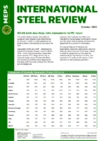Steel at heart of political debate in US Election year
Steel became a subject of political debate in the United States as opposition to Nippon Steel’s proposed US Steel takeover grew and senators called for Section 232 duties on imports from Mexico in March.
Nippon reiterated that it was determined to see through its USD14.9 billion acquisition of US Steel after President Joe Biden stated that it was “vital” for the company to remain “domestically owned and operated”. The President is currently fighting his re-election campaign against Donald Trump, who has said that he would immediately block Nippon’s acquisition of US Steel if elected.
MEPS respondents reported that meetings between the Japanese steelmaker and the United Steelworkers union were short and unproductive. The union wants reassurances about workers’ employment agreements but has also raised concerns about supply chains and national defence.
An investigation into Nippon’s acquisition of US Steel is being conducted by the US’s Committee on Foreign Investment in the US (Cfius). The body scrutinises the potential effect of the acquisition of US companies by foreign businesses to determine the effect of such transactions on national security.
Separately, a political campaign attempting to protect US steelmakers from cheap steel imports got underway in March.
Senators stand against imports from Mexico
An alliance of US senators is calling for the reinstatement of 25% Section 232 import duties on material imported from Mexico. They introduced a bill to Congress – called the ‘Stop Mexico’s Steel Surge Act’ – earlier this month.
Mexican steelmakers are currently free of duties because the country is part of USMCA free trade agreement, which replaced NAFTA.
Restricting the volume of material crossing the border could ease the downward pressure on prices which translated into further decline since the start of the year. In March, MEPS respondents reported “extremely short” lead times and an “ample supply” of coil and rebar. Capacity is outstripping current demand in the US.
The American Iron and Steel Institute (AISI) is backing the senators’ bill. Market participants indicated that the imposition of the duty could go ahead, although their expectations were of a temporary 12-month application.
Rising rebar volumes
Data published by AISI in late February showed that Mexico was the US’s third-largest source of imported steel during January. Volumes were up 36% month-on-month at 396,000 short tons.
However, preliminary import data for 2023 indicated that Mexico-origin imports were down 21.1% in 2023 as a whole, at 4.2 million short tons. Rebar and semis imports have surged by 1,732% (to 222,416 short tons) and 108% (to 1.60m short tons), respectively, since the 2015-17 period which defined the terms of the USMCA.
Steel buyers told MEPS that imports from Mexico would become unviable if Section 232 duties were applied. In a market where supply currently exceeds demand, the loss of this material may have a limited impact on prices.
The outcome of the Presidential elections and the prospect of interest rate cuts later in the year are likely to have more on an influence for demand growth and upward steel price movements.
- This content first appeared in the March edition of MEPS International's Stainless Steel Review. The monthly report provides subscribers with steel prices, indices, market commentary and forecasts from across the globe.

Source:
International Steel Review
The MEPS International Steel Review is an essential monthly publication, offering professional analysis and insight into carbon steel prices around the world.
Go to productRequest a free publication





